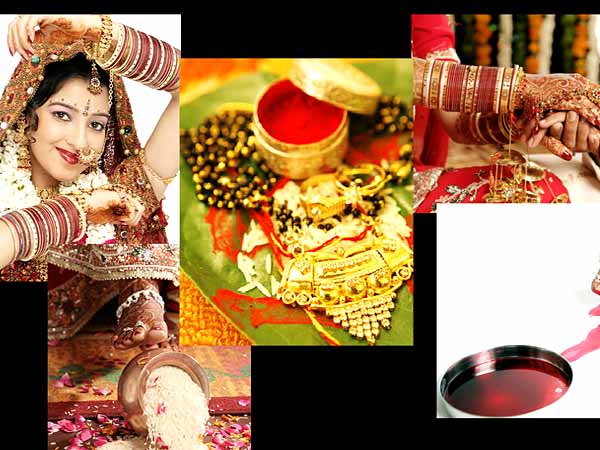Primarily, eight kinds of Hindu marriages existed in ancient India. In this article, learn about the eight different kinds of Hindu weddings.
Types Of Hindu Marriages

|
Mythology says that there are eight different types of Hindu marriages. Historical records support this perception, by saying that some of these types of marriages were prevalent in ancient India, among the people following Hinduism. Although not all the eight marriages had a religious sanction, it is said that they were observed among many communities of the people, following Hinduism, in the ancient time. People argue that many of them are still seen among the Hindus. In this article, we have discussed about the eight types of Hindu weddings in India.
Eight Types of Hindu Weddings
Brahma marriage
According to the Brahma marriage, a boy is eligible to get married, once he has completed his Brahmacharya (student hood). Parents, who search for a bride for their son, would consider the family background of the girl, whom he is going to marry. On the other hand, the bride's father would ensure that the boy has acquired knowledge of the Vedas. This is how a Brahma marriage was arranged. There was no system of dowry. Among the eight types of marriage, brahma marriage holds a supreme position.
Daiva Marriage
In this type of marriage, the girl's family waits for a particular time, to get her married. If they do not find a suitable groom for their daughter, then they would marry her off to places, where sacrifices are conducted. In this case, the girl is generally married to a priest, who conducts sacrifices. According to the sastras, Daiva marriage is considered inferior to Brahma marriage, because it is considered degrading for the womanhood.
Arsha Marriage
Arsha marriage is the one, wherein the girl is married to the sages or rishis. References from dharmasastras tell us that in arsha marriage, the bride is given in exchange of two cows, received from the groom. The girl is generally married to an old sage. The cows, which were taken in exchange of the bride, shows that even the groom do not have any remarkable qualities. According to sastras, noble marriages had no monetary or business transactions. Therefore, these kind of marriages were not considered noble.
Prajapatya Marriage
Monetary transactions and Kanyadaan are not parts of Prajapatya marriage, unlike the Brahma marriage, where these two forms an important and basic part. Unlike the Brahma marriage, here, the bride's father goes in search for a groom for his daughter. The Brahma type is considered better than prajapatya, because in the former, the groom's family goes out to seek a suitable bride for their son.
Gandharva Marriage
Gandharva marriage is similar to love marriage. In this case, the bride and the groom get married secretly, without the knowledge of their parents. It is not considered a right kind of marriage, as it is done without the consent of the parents. This marriage reminds us of the love affair of the mythological characters - Sakuntala and Dushyanta.
Asura Marriage
In the Asura marriage, the groom is not at all suitable for the bride. Although the groom is not suitable for the bride, he willingly gives as much wealth as he can afford, to the bride's parents and relatives. Therefore, the system of marriage is more or less like buying a product, which makes it undesirable in the present time.
Rakshasa Marriage
According to Rakshasa marriage, the groom fights battles with the bride's family, overcomes them, carries her away and then persuades her to marry him. This is not considered as the righteous way to woo a girl for marriage, because forcible methods are used by the groom to tie the wedding knot.
Paishacha Marriage
Paishacha marriage is the eighth and last type of Hindu wedding. It is considered as the inferior type of marriage, because the girl's wish is not considered, even if she is not willing to marry the person chosen for her. In fact, she is forced to marry. Moreover, the bride's family is also not given anything in cash or kind. Literally, the girl is seized against her wish. Men would marry a woman, whom he had seduced while she was asleep, intoxicated or insane. This kind of marriage was later on prohibited.



